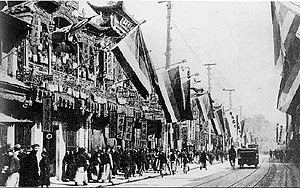Anti-Qing sentiment
Anti-Qing sentiment refers to the feelings of opposition, resentment, or hostility towards the Qing dynasty, the last imperial dynasty of China, which ruled from 1644 to 1912. This sentiment was prevalent among various groups in China and played a significant role in the social and political upheavals that eventually led to the Qing dynasty's downfall and the establishment of the Republic of China in 1912.
Origins and Causes[edit | edit source]
Anti-Qing sentiment had its roots in multiple factors. The Qing dynasty was founded by the Manchus, a non-Han ethnic group from the region that is today's Northeast China. The conquest of China by the Manchus was seen by many Han Chinese as a foreign occupation, which laid the foundation for ethnic tensions. The imposition of Manchu customs, such as the mandatory wearing of the queue hairstyle by Han men, was resented as a symbol of subjugation.
Economic hardship and natural disasters further exacerbated the public's dissatisfaction with the Qing rule. The government's inability to effectively manage these crises, along with widespread corruption, led to increased suffering among the peasantry and urban poor.
The Opium Wars and subsequent unequal treaties with Western powers diminished the Qing's prestige and sovereignty, leading to a loss of territory and the imposition of extraterritorial rights for foreigners in China. These humiliations contributed to a nationalistic response among the Chinese, who blamed the Qing for the country's weakened state.
Major Uprisings and Rebellions[edit | edit source]
Several major uprisings were indicative of the growing anti-Qing sentiment. The most notable among these was the Taiping Rebellion (1850-1864), led by Hong Xiuquan, who envisioned the establishment of the Taiping Heavenly Kingdom, a Christian theocratic state. The rebellion was one of the deadliest conflicts in history, causing millions of deaths and severely weakening the Qing dynasty.
The Boxer Rebellion (1899-1901) was another significant anti-foreign and anti-Christian uprising, which also targeted the Qing dynasty for its failure to defend China against foreign encroachments. Although initially supportive of the Boxers, the Qing government eventually joined forces with the Eight-Nation Alliance to suppress the rebellion, further damaging its legitimacy among the Chinese people.
Revolution and the End of the Qing Dynasty[edit | edit source]
The culmination of anti-Qing sentiment came with the Xinhai Revolution in 1911, which led to the abdication of the last Qing emperor, Puyi, in 1912. The revolution was spearheaded by the Wuchang Uprising, a result of both internal discontent and the influence of revolutionary ideas propagated by figures such as Sun Yat-sen. The establishment of the Republic of China marked the end of over two thousand years of imperial rule and the beginning of a new era in Chinese history.
Legacy[edit | edit source]
The legacy of anti-Qing sentiment is complex. While it contributed to the overthrow of the Qing dynasty and the establishment of a republic, it also left a legacy of ethnic tensions and contributed to the chaotic warlord era that followed the dynasty's collapse. In contemporary China, the Qing dynasty is often viewed with a more nuanced perspective, recognizing its contributions to Chinese culture and statecraft alongside its failures.
Search WikiMD
Ad.Tired of being Overweight? Try W8MD's physician weight loss program.
Semaglutide (Ozempic / Wegovy and Tirzepatide (Mounjaro / Zepbound) available.
Advertise on WikiMD
|
WikiMD's Wellness Encyclopedia |
| Let Food Be Thy Medicine Medicine Thy Food - Hippocrates |
Translate this page: - East Asian
中文,
日本,
한국어,
South Asian
हिन्दी,
தமிழ்,
తెలుగు,
Urdu,
ಕನ್ನಡ,
Southeast Asian
Indonesian,
Vietnamese,
Thai,
မြန်မာဘာသာ,
বাংলা
European
español,
Deutsch,
français,
Greek,
português do Brasil,
polski,
română,
русский,
Nederlands,
norsk,
svenska,
suomi,
Italian
Middle Eastern & African
عربى,
Turkish,
Persian,
Hebrew,
Afrikaans,
isiZulu,
Kiswahili,
Other
Bulgarian,
Hungarian,
Czech,
Swedish,
മലയാളം,
मराठी,
ਪੰਜਾਬੀ,
ગુજરાતી,
Portuguese,
Ukrainian
Medical Disclaimer: WikiMD is not a substitute for professional medical advice. The information on WikiMD is provided as an information resource only, may be incorrect, outdated or misleading, and is not to be used or relied on for any diagnostic or treatment purposes. Please consult your health care provider before making any healthcare decisions or for guidance about a specific medical condition. WikiMD expressly disclaims responsibility, and shall have no liability, for any damages, loss, injury, or liability whatsoever suffered as a result of your reliance on the information contained in this site. By visiting this site you agree to the foregoing terms and conditions, which may from time to time be changed or supplemented by WikiMD. If you do not agree to the foregoing terms and conditions, you should not enter or use this site. See full disclaimer.
Credits:Most images are courtesy of Wikimedia commons, and templates Wikipedia, licensed under CC BY SA or similar.
Contributors: Prab R. Tumpati, MD




